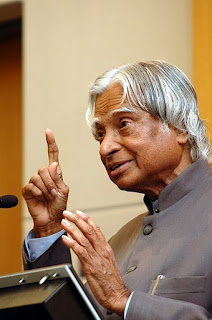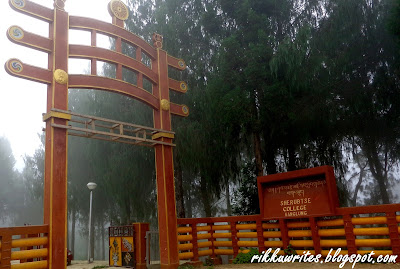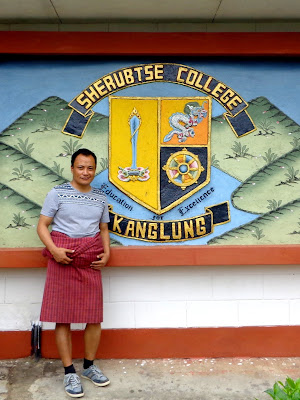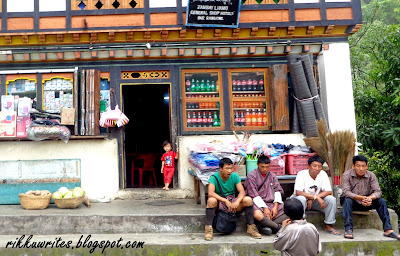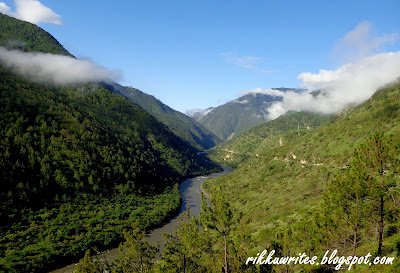The Prime Minsiter Tshering Tobgay inaugurated the office for Royal Bhutan
Helicopter Services Limited at Paro Airport on August 10, 2015. And….bam it has
become a delicious headline and mockery almost everywhere - on social media,
social gatherings and chats. It was not to do with the launch of helicopter
service, but for an amusingly intriguing reason - misspelling of helicopter.
 |
| Pic: BBS |
At first, I felt it was a deliberate political scam, or sort of photosophed
image. So I checked with images in newspapers and websites. Err it wasn’t; the inaugural board that Lyonchhen has inaugurated
really spells “helicotper.”
I just wondered, “How come?” But I instantaneously settled to it’s just a spelling error.
This morning when I logged into Facebook I was thoroughly captivated
by hilarious discussions going on about this particular misspelling. People
were throwing comments so frequently, sharing it rampantly, loud.
I assume by now the person who had printed the board must have
realized his mistake, and Lyonchhen must be blushing too.
I
have picked up some of the interesting comments and reactions from the Facebook
users and here they are:
Wangdi Wangdi: “Spelling
mistake instead of Helicopter how come Helicotper ya.”
Pasang
Norbooz: “HELI-COT-PER (kotper or
copter) RIP english.”
Younten
Jamtsho “Hhaaaa. Leyonchen proudly
inaugurating the HeliCotper. .. what an achievement.”
TB GheaShung: “LOL... is
Helicotper model no/series no of helicopter?”
I believe that nowhere else a simple spelling mistake had aroused
such exciting discussions entailing defamation. This is truly interesting and
something that we must not forget - that a simple misspelling not only wrecks
your life but can bring blushes to even personality like Prime Minister and his
government.
There
are others who have justified the misspelling, but in a funny way, as written
below:
Sonam
Jamtsho: “Spelling mistake is due
to new service in bhutan.”
Thrinley Jamtsho: “There is
no one in Bhutan who can make helicopter so we write helicotper. but in future
there will be someone who can make so at that time bhutan will write right
spelling.”
Chundhu Nidup Tshering: “Very
soon bhutan will also launch.... Arrowplane not Aeroplane.”
Meanwhile,
the discussion has brought to an issue of an inherent problem of Bhutanese
attitude; that we very negligible and complacent. Karma wrote, “This is a silly mistake. We are talking of our Prime
Minister here. This is called due diligence in our assigned work. Where is it
in this one? Shameful. I don't find it funny. I find it shameful.”
Tashi Jyatsho added, “It was such a BIG
event, after all the Prime Minister of Bhutan is going to come and inaugurate
the office, and no doubt, it will be widely publicized. So why did they not
care to correct the typo? Because they thought ah! never mind!! (Khed Mid). In
fact this is the attitude of our people.....the Khed Mid attitude......that is
dragging our country in all fields of development!!”
Some people felt that it is a “Bad Omen”. Because “We believe in signs and significance when beginning
something important,” a comment justified.
Others went on to say that the person “Who was responsible for
the board” and error “should be fired”, “sue”, “Cut away the both hands, of the
writer and designer”.
Above
all, it stirred the political drama and questioned the ruling government’s election
campaign promises. Kailash
Shongbhen Rai reacted, “OMFG......this
is the flagship agenda of present government n finally it came with spelling
blunder.”
Similarly
Jumbo Page
commented, “Great job PM. Enjoy the service
and watch jobless people from up there.”
However,
there are people who feel the mistake is pardonable and should not be publicized
too widely, cruelly. Wang Chu justified, “Anyway
everyone makes mistakes,we r human.” Another Facebook user supported, “This cn b corrected,instead of
criticising,help d agency to correct it,useless fellows only criticise.”
TB Ghisingh
Tamang: “understanding is more important
than the spelling.”
Tshere Lham: “Hats off to the govt for providing wat is
promised.”
Passang Tshering: “But looking
beyond the ridiculous typo I must congratulate the government on the big
development. It will change the face of rescue services and perhaps also
transportation service (if only affordable to the Commons).”
So I would like to ask you, what’s in a spelling?
In fact, I have been always fascinated by Juliet’s dialogue
in Shakespeare’s “Romeo and Juliet”,
"What's
in a name?
That
which we call a rose
By
any other name would smell as sweet."
Here
Juliet is referring to Romeo that a name is an artificial and meaningless
convention and the names of things or person do not
affect what they really are. This dialogue encapsulates the central struggle
and tragedy of the play, so here the spelling of helicopter and it has created
a whole drama of mockery, fun and political attacks.
What’s in a spelling? I am not an expert
to solve this puzzle, but I am very much sure that from now onwards Bhutanese
people will never make mistake in writing the spelling of helicopter. Yes, even
on social media.
So I
end this post on a happy note by quoting what Passang Tshering wrote, “Ha ha ha this also means that
the signboard designer had a good sense of humor and a perfect publicity plan.
Would this picture be shared if not for this typo? Lol”
Note:
I didn’t seek due permission from those whose comments appeared here because it
has already appeared in public (social media). Thank you.







